- Home
- Steven Brust
The Lord of Castle Black Page 5
The Lord of Castle Black Read online
Page 5
Grita moved around, hoping to hear conversations by others of her enemies. Indeed, she was able to hear Tazendra speak, but the subject of Tazendra's conversation involved speculation on what sorts of changes in fashion might have occurred had the Interregnum not intervened—speculation with which we will not tire our readers. This monologue—for it cannot be called a conversation—was listened to by Kytraan; Piro held himself apart and stared out into the night (of which, because the campfire was behind him, he could see nothing) and spoke to no one, evidently occupied by his own thoughts.
We need hardly add that Grita learned nothing that night. She was, however, not in the least discouraged, but, with that patience we have already mentioned, followed them again the next day as they retraced their path along the Blood River. Once again, after a day's travel they made camp, and once again Grita crept as close as she dared, hoping to hear something to her advantage. This time, the conversation between Lar and Mica had to do with the best way to open a wine bottle if one didn't have wine tongs, as well as about certain incidents each had heard of in which a lady of the aristocracy had been known to lower her standards and engage in dalliances with a servant, combined with notes on the dangers of such liaisons. Grita worked her way around once more, and this time heard Kytraan saying, "… am worried about what we are going to tell Sethra Lavode."
"How," replied Piro. "What we will tell her? Why, we will tell her what happened."
"And then?"
"And then she will know."
"Pah. I do not like it."
"What is it you mislike?"
"To return thus, having utterly failed."
"And so, Kytraan, what do you suggest? Would you prefer not to return?"
"No, that was not the meaning I intended to convey."
"Well, then?"
"Rather this: I should like to accomplish something first, and then return."
"Accomplish something? But, what do you pretend we can accomplish?"
At which time another voice, which Grita recognized as that of Tazendra, entered the conversation, saying, "Cha! as your father would say, good Viscount. I know the answer to that!"
"And cha yourself," said Piro. "I am well enough aware of what you would do!"
"Well, and?"
"And I say," said Piro, "what I have said all along: We ought at once to inform the Enchantress of what has occurred. After we have done so, if we choose to run our own errand, well, I will say nothing against it."
"By the time we have returned to Dzur Mountain," said Kytraan, "it will be too late."
"That may be true."
"And then?"
"Nevertheless, it is what we ought to do."
"Perhaps," said Kytraan, "we could send one of the lackeys back to tell the Enchantress what has happened, while we continue with our business."
"Why now," said Tazendra. "There is an idea. What do you think of Kytraan's idea, Piro?"
"It is one I had not thought of," admitted Piro.
"And do you think it a good one?" said Kytraan.
"I must consider it."
"Oh," said Tazendra, "we have nothing against considering."
"No, indeed," said Kytraan. "I, myself, have been known to consider on occasion, and would scarcely begrudge another's chance to consider."
"That is good, then; I will do so."
"And will you do so now?" said Tazendra.
"I am considering this very instant," said Piro. .
"That is good," said Kytraan.
"Yes. I could not tell, or I should not have asked," said Tazendra.
"Then it is right that you asked."
"Do you think so?"
"I am certain of it."
"Well, then I am pleased."
"And you should be. But, your pardon, I am considering."
"Of course," said Tazendra, falling silent.
"Very well," said Piro, after a moment. "I agree. We will send one of the lackeys back with the message."
Grita then heard a sound which, after some consideration on her part, she concluded was one of them clapping his hands together.
"Then," said Tazendra, "it is decided. Only—"
"Yes?"
"Which one shall we send?"
"Oh," said Kytraan, "it doesn't matter."
"How, doesn't matter?" said Piro. "Well, neither one is your lackey."
"That is true," said Kytraan. "Then I shall say no more about it."
"Oh, on the contrary," said Tazendra. "You must say a great deal more about it."
"Indeed?" said Kytraan. "Well, what must I say?"
"Why, you must choose which one goes."
"Who, I?"
"Yes, you. What is your opinion, Piro?"
"I am entirely in agreement with you, my dear Tazendra. You, Kytraan, have no lackey, therefore you are the one to choose which one takes the errand."
"Very well," said Kytraan. "Let Mica go, because he has more experience, and a better chance to arrive safely."
"Agreed," said Tazendra.
"Agreed," said Piro.
"I will instruct him to set out in the morning."
"Yes," said Kytraan. "And we, well, we will set off on our own errand, and, if Fortune favors us, well, we will take the vengeance we wish."
"Indeed we will," said Tazendra.
"Indeed they will," said Grita to herself, smiling grimly and stealing off into the night.
Mica, when informed of this mission (the reader will understand if, even though Grita has left, we continue to follow Piro and his friends for a time), was of two minds on the subject. To the right, he was flattered by the confidence that was shown in him by entrusting to him such an important assignment. But, to the left, he considered a journey of months, on his own and through dangerous country, to be a matter of some concern. But, as he was given no choice in the matter, and, moreover, as the look on Tazendra's countenance made it clear that there was no question of joking, then to be sure, was there to be no question of arguing; he therefore made plans to depart early the next morning.
As he made these preparations, Lar said, "I wish you good fortune upon your journey, my friend."
"I thank you for your kind wishes."
"Does the mission frighten you?"
"Frighten me? You ask if it frightens me?"
"Yes, I do, because I am curious."
"Well, I nearly think it does!" said Mica with great enthusiasm.
"It would frighten me," said Lar.
"Yes," said Mica.
"In addition to bandits, there are various beasts, after all."
"I know."
"Or dangers of simple accidents, which are an inconvenience when traveling with a group, but can be fatal when alone."
"Yes, but—"
"Or starvation, on such a long trip."
"If you—"
"Even dying of thirst is possible."
"Wouldn't mind—"
"Or you might become ill—"
"Will you have done?"
Lar paused. "Ah. I beg your pardon. I perceive I have discomposed you."
Mica glared at him. Lar swallowed with some difficulty and said, "Well, is there some help I can give you in your preparations for departure?"
"No," said Mica coldly.
"Oh, come now, my friend. I have apologized. There must be a great deal yet undone. Permit me to help you."
Mica relented, and the two of them set about selecting what Mica would need to begin his long, solo journey on the morrow. In the meantime, Piro, Tazendra, and Kytraan sat around their fire, each lost in his own thoughts, and unaware that their conversation had been overheard by her whom they hoped to hunt down. At length the fire burned down, and Mica's preparations were finished, and they fell asleep.
Early the next morning, as the first light was just beginning to brighten the Enclouding, Tazendra pulled Mica aside in order to be certain he understood his mission. "You must reach Dzur Mountain as quickly as you can manage, and you must give the Enchantress this le
tter which Piro has done you the honor to entrust to you."
"Yes, mistress."
"To this," she continued, "I add this purse, which contains seventy good silver orbs, which are still in use, and one gold imperial, which ought to be plenty to see you through any emergencies, as well as purchasing any food and supplies you may need from whatever mountain villages you may pass. Apropos, you must be careful in bringing out the purse, because some of those who live in the mountains are not particular about differentiating between coins that are their own and coins they can acquire by some means or another."
"I understand, mistress. I will be careful."
Tazendra nodded and continued, "If, by chance, something happens to the letter, you must tell the Enchantress what has happened—that is, that Zerika leapt over Deathgate Falls to her death, that we were treacherously attacked by a certain Grita of whom she has heard me speak in the past, and that we are now in pursuit of this Grita, as well as the brigands she has hired while calling herself Orlaan. Be certain to tell her this name, as she may use it again. Do you understand all this?"
"You will see, mistress: The letter first, failing that, Zerika has leapt, Grita has attacked, and you are pursuing Grita, Grita is called Orlaan."
"That is it. And, if you can do so without compromising your mission in other ways—"
"Yes, mistress?"
"Have a care for your skin."
Mica bowed as if, in fact, he had intended all along to do nothing exceptionally rash with regards to his life, though whether as a favor to his mistress, out of duty for the mission, or for his own reasons, we will not speculate.
These last instructions given, then, and with a backward glance to Lar, who raised his hand in salute, Mica continued as they had been going, following the Blood River, mounted on his pony, his faithful bar-stool strapped to its side.
Lar watched him disappear, then turned back to Piro as if to say, "And now, what of us?" though, of course, he did not actually utter these words.
Piro shrugged and, as if in answer, turned to Kytraan. "Well, my friend, it was your wish to find this Orlaan, or Grita. Have you a plan as to how to go about it?"
"I? Not the least in the world. In my opinion we should ask Tazendra."
"Who, I?" said the Dzurlord. "Well, if truth be told, I have never been gifted in regard to plans. That is to say, in making them. In carrying them out, well, that is a different matter entirely."
"Yes," said Kytraan, "I understand that. But in the old days, well, who was it to whom you turned for plans?"
"Who was it? Why, we had a Tiassa with us, and so felt no need to look further."
Piro sighed, as if he had been expecting no other answer but this.
"Well," he said after reflecting for a moment, "we cannot know where she has gone—whether back the way she came, or following us, or in another direction entirely; and so—"
"How," said Kytraan. "You think she may be following us?"
Piro shrugged. "How are we to know?"
"Bah!" said Tazendra. "Do you think she would have the audacity?"
"You know her best of all of us," said Piro. "Would she?"
"Well," said Tazendra, "that is to say—" She broke off and frowned. "It is not impossible," she said at last.
"And then?" said Piro.
Tazendra frowned and fell silent in evident contemplation. Piro and Kytraan (and of course Lar) maintained their silence, aware that contemplation was not Tazendra's special skill and that therefore she should be given all of the assistance she might require.
At length, Tazendra stood up and said, "If you, my friends, would be so good as to wait here, I shall return directly."
"We will do so," said the Dragon and the Tiassa.
Tazendra walked out from the fire and began a careful inspection of the ground surrounding the camp while Piro and Kytraan, as promised, waited quietly, exchanging glances but making no remarks.
After some time, the Dzurlord returned.
"Well?" said Piro anxiously, observing she had acquired a certain paleness.
"Well," said Tazendra. "You are right. She has been here, outside of our camp."
"Shards!" said Kytraan.
"Indeed," said Piro, a grim expression stealing over his countenance.
"But, how can you be sure?" said Kytraan.
"How?" said Tazendra. "Because I looked."
"Very well, I understand that you looked. But, what did you see?"
"Oh, you wish to know that? Well, I will tell you. There are footprints in the area outside of our camp."
"Well then," said Kytraan, "there are footprints."
"But then," continued Tazendra patiently, "it would seem that someone was there."
"Oh, I agree that someone was there. Only, how can you know it was Grita?"
"I am explaining that very thing," said Tazendra, a trifle impatiently.
"Very well, then, I will listen."
"That will be best. So then, there are footprints. But you perceive that, although we traveled this way two days ago, our own footprints are no longer visible, nor are there any signs of the prints which our horses must have made, which means that rain or wind has effaced them. If the footprints I observed are still there, it seems probable that these were made by someone who was here more recently, which I would think to be last night."
"Well, there is something in that."
"Moreover—"
"Yes?"
"—why else would someone—whoever made the footprints, because I am convinced that, if there are footprints, there are feet to make them, and these must be attached to legs, and so to a body—why else would this someone be so careful to remain around the edge of our camp other than to observe us?"
"Your logic is inarguable," observed Piro. "Especially the matter of footprints requiring feet, and so on."
"And in addition," said Tazendra, who, now that she had begun her train of logic, was no more able to prevent it from reaching its conclusion than a boulder, once it begins rolling, is able to stop before it has exhausted itself, "the footprints were made by a pair of boots with a small, square heel and with a peculiar texturing on the sole—in other words, boots made for walking through a variety of terrain, rather than one made for the city street or for riding. Now I happened to observe Grita's boots when we saw her, and they were just of this type."
"Well observed," murmured Kytraan.
"Moreover, if one were to study the marks, as I have done, one might observe the peculiar impression made by someone standing in one spot and shifting his weight back and forth, as will happen when remaining in place over a long period of time, as if listening. Therefore, I conclude that it was Grita who was sneaking around our camp last night, and that she was attempting to hear our plans, and, moreover, may well have done so."
Tazendra finished, and Kytraan and Piro stared at her in silent astonishment, as they had never had cause to suspect that the Dzurlord was capable of this sort of observation, not to mention the reasoning that accompanied it. At length, Piro said, "Well, I understand."
"As do I," said Kytraan.
"We must, then, remain on our guard at all times," said Piro. "Do you agree, Kytraan?"
"Nearly."
"And you, Tazendra?"
"Oh, I am convinced of it," said the Dzurlord, grimly bringing her fine hand with its long fingers to wrap around the hilt of her sword.
"Or—" said Piro.
Kytraan turned to look at him. "Yes? Or, you said?"
"Or, instead of being on our guard—"
Tazendra frowned. Kytraan said, "Yes?"
"Well, perhaps we could follow her from her tracks."
Tazendra's eyes widened. "Follow her from her tracks?"
"Perhaps," said Piro.
"It is a thought," said Kytraan.
"And yet," said Tazendra, "could her tracks not lead into an ambuscade?"
Piro shrugged. "It is not impossible. And then?"
"Splinters!" said Kytraan. "Why, then we sh
ould be killed!"
"Well, that is possible," admitted Piro.
"But then," said Tazendra, "perhaps we will turn the ambuscade back upon those who attempt to snare us. It is what we used to do in the old days, you know; it became something of a habit."
"It is a good habit," agreed Kytraan. "And yet—"
"Well?"
"I am not convinced that we can do it."
Tazendra shrugged. "Well, and if we fail, what will happen? We will die, that is all."
"That is true," said Kytraan. "Your argument is a good one."
"And then?" said Piro, who was, if truth be known, a little dubious about Tazendra's proposition, but who did not want to lose the opportunity. "Besides," he told himself, "more than likely there will be no ambuscade."
"Very well," said Tazendra. "I agree to following her tracks."
"As do I," said Kytraan.
"Then let us pack up and be about it," said Piro.
We should add, in case the reader has not noticed, that there was one member of the party, by which we mean the worthy Teckla, Lar, who had not been consulted. But this, of course, was only to be expected.
Lar packed up the camp, thinking his own thoughts, and they set out to follow Grita's tracks, as the hunted became the hunters, and the hunter, the hunted. As to whether this transition will occur one or more times again in the future, we do not, at this moment, choose to reveal.
Chapter the Thirty-Ninth
How Kâna Learned What Zerika
Had Been Doing, and Took Steps
On the other side of the continent—that is, in the Kanefthali Mountains—as these events were unfolding, certain other matters were occurring which cannot be ignored by the prudent historian. To be precise, Habil found her cousin—that is to say, Skinter, the Duke of Kâna, or the Emperor of Dragaera as he now styled himself—in the library, and at once said, "My dear cousin, there is a problem."
Skinter looked up from the map he was studying—a map which detailed certain areas to the northeast of Suntra—and said, "Not in the least."

 Phoenix
Phoenix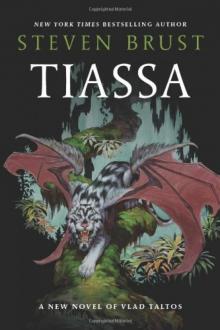 Tiassa
Tiassa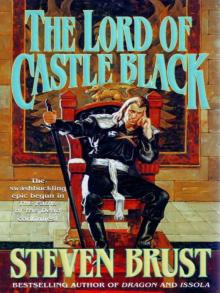 The Lord of Castle Black
The Lord of Castle Black To Reign in Hell: A Novel
To Reign in Hell: A Novel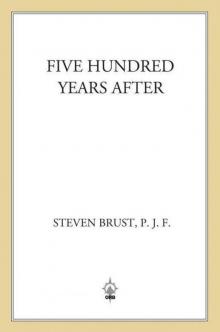 Five Hundred Years After (Phoenix Guards)
Five Hundred Years After (Phoenix Guards) The Book of Dzur: Dzur ; Jhegaala
The Book of Dzur: Dzur ; Jhegaala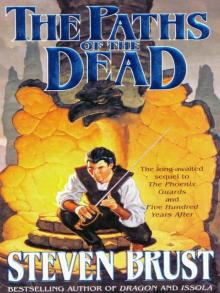 The Paths of the Dead
The Paths of the Dead Jhegaala
Jhegaala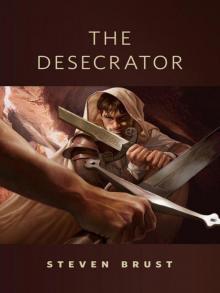 The Desecrator: A Tor.com Original
The Desecrator: A Tor.com Original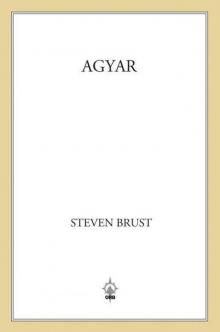 Agyar
Agyar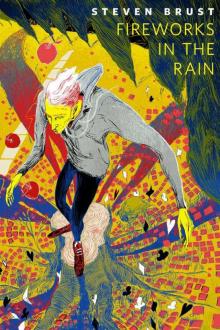 Fireworks in the Rain
Fireworks in the Rain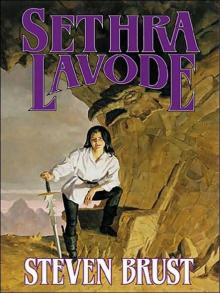 Sethra Lavode
Sethra Lavode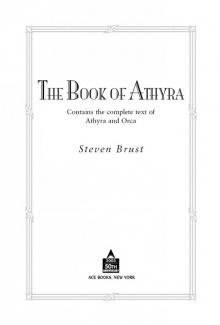 The Book of Athyra
The Book of Athyra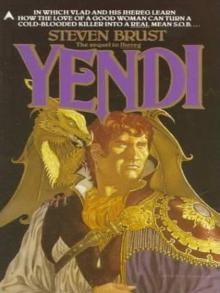 Yendi
Yendi Good Guys
Good Guys The Book of Jhereg
The Book of Jhereg Cowboy Feng's Space Bar and Grille
Cowboy Feng's Space Bar and Grille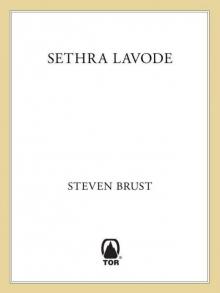 Sethra Lavode (Viscount of Adrilankha)
Sethra Lavode (Viscount of Adrilankha) My Own Kind of Freedom
My Own Kind of Freedom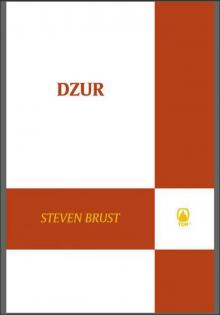 Dzur (Vlad Taltos)
Dzur (Vlad Taltos)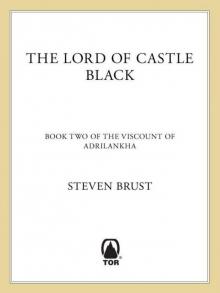 The Lord of Castle Black: Book Two of the Viscount of Adrilankha
The Lord of Castle Black: Book Two of the Viscount of Adrilankha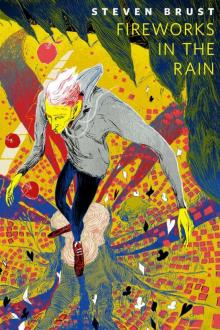 Fireworks in the Rain: A Tor.Com Original
Fireworks in the Rain: A Tor.Com Original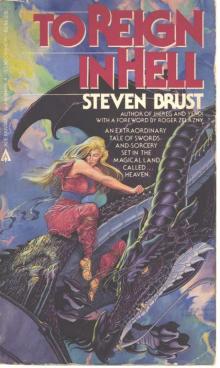 To Reign In Hell
To Reign In Hell Issola
Issola Orca
Orca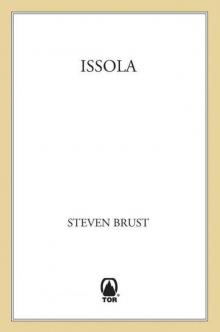 Issola (Vlad Taltos)
Issola (Vlad Taltos)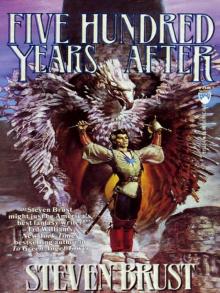 Five Hundred Years After
Five Hundred Years After The Phoenix Guards
The Phoenix Guards Taltos
Taltos![[Vlad Taltos 06] Athyra Read online](http://i1.bookreadfree.com/i1/03/24/[vlad_taltos_06]_athyra_preview.jpg) [Vlad Taltos 06] Athyra
[Vlad Taltos 06] Athyra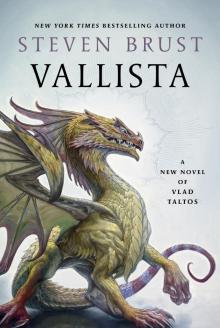 Vallista--A Novel of Vlad Taltos
Vallista--A Novel of Vlad Taltos The Incrementalists
The Incrementalists![[Vlad Taltos 04] Taltos Read online](http://i1.bookreadfree.com/i/03/24/[vlad_taltos_04]_taltos_preview.jpg) [Vlad Taltos 04] Taltos
[Vlad Taltos 04] Taltos![[Vlad Taltos 03] Teckla (v 1.1) Read online](http://i1.bookreadfree.com/i1/03/27/[vlad_taltos_03]_teckla_v_1_1_preview.jpg) [Vlad Taltos 03] Teckla (v 1.1)
[Vlad Taltos 03] Teckla (v 1.1)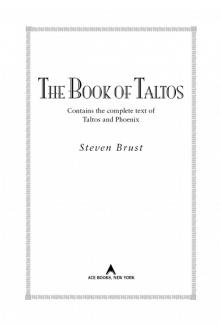 The Book of Taltos
The Book of Taltos The Paths of the Dead (Viscount of Adrilankha)
The Paths of the Dead (Viscount of Adrilankha) Jhegaala (Vlad Taltos)
Jhegaala (Vlad Taltos)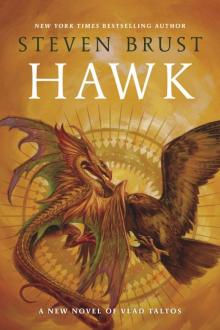 Hawk (Vlad)
Hawk (Vlad)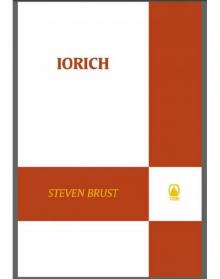 Iorich
Iorich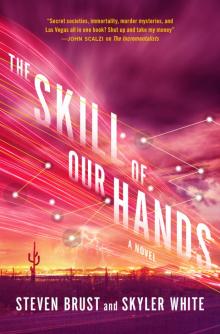 The Skill of Our Hands--A Novel
The Skill of Our Hands--A Novel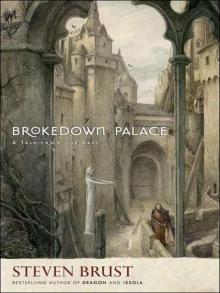 Brokedown Palace
Brokedown Palace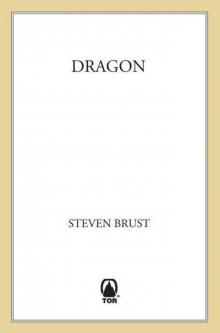 Dragon (Vlad Taltos)
Dragon (Vlad Taltos) Dragon
Dragon Athyra
Athyra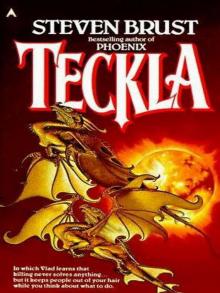 Teckla
Teckla Dzur
Dzur